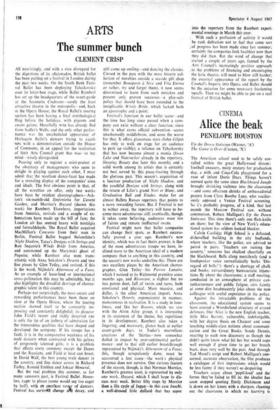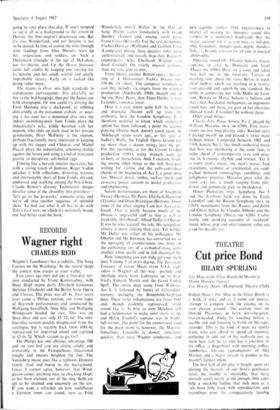CINEMA
Alice the beak
PENELOPE HOUSTON
The American school used to be safely cor- ralled within the great Hollywood dream: football sweaters, misty oratory for graduation day, a milk and Coca-Cola playground for a race of infant Doris Days. Things haven't seemed quite the same since Blackboard Jungle brought shrieking violence into the classroom —and some offscreen shrieks of ambassadorial protest from Clare Boothe Luce, who vocifer- ously opposed a Venice Festival screening. So it's probably progress, of a kind, that last month the Moscow Festival saw, without commotion, Robert Mulligan's Up the Down Staircase. This time there's only one flick-knife on show; but the view of New York's educa- tional system has seldom looked bleaker.
Calvin Coolidge High School is a defeated, dishevelled building in the city badlands, where teachers, like the police; are advised to patrol in pairs. 'Teachers are ruining the country,' someone has chalked cheerfully on the blackboard. Bells clang mercilessly (and a loudspeaker voice surrealistically barks 'Dis- regard all bells!'); there's a shortage of chalk and books; extraordinary bureaucratic injunc- tions fly about the classrooms; a staff meeting, conducted in an atmosphere of private can- tankerousness and public fatigue, stirs faintly at some dire headmasterly joke about the new colleague with useful experience in the police.
Against the intractable problems of the classroom, the educational system seems to have erected a Wonderland structure of crazed defences. Our Alice is the new English teacher, little Miss Barrett, vulnerable, indefatigable, with her degree thesis on Chaucer and some touching middle-class notions about communi- cation and the Great Books. Sandy Dennis, reacting to each new. discovery as though she didn't quite know what hit her but would cope well enough if given time to get her breath back, does very well by the part. And through Tad Mosel's script and Robert Mulligan's con- cerned, accurate observation, the film produces a catalogue of first impressions which would be less funny if they weren't so despairing.
Teachers argue about 'pupil-load' and the forms they've failed to fill in; the idealist has soon stopped quoting _Emily Dickinson and is down on her knees with a dustpan, cleaning out the classroom in which no learn irg is
going to take place that day. If one's tempted to see it all as a background to the streets of Detroit, the film mightn't discourage one. But it's also Wonderland, and our heroine is not to be denied. In time of course she wins through with readings from Silas Marner, tears up her resignation, and soldiers on. Such a Dickensian triumph, in the age of McLuhan, has its charm; and Up the Down Staircase earns full credits by keeping one rooting for its heroine and her small, wistful and utterly improbable victory. Early on it looked like doing rather more.
The Game is Over sets high standards in conspicuous extravagance: first playfully set fire to the bed-hangings, then put the flames out with champagne. Or one could try driving the Ford Mustang into a duckpond; or nibbling distractedly at the poisonous orchids; or wear- ing a fur coat for a demented dive into the indoor swimming-pool. Jane Fonda plays the industrialist's wife, wildly besotted with her stepson, who ends up stark mad in her private gymnasium; Peter McEnery is the stepson, perhaps fractionally more interested in keeping up with his rugger and Chinese; and Michel Piceali plays the industrialist, scheming darkly against the lovers and using a kind of miniature garotte to decapitate soft-boiled eggs.
Filming like a berserk interior decorator, but with a saving touch of humour, Roger Vadim splashes it with reflections, distorting mirrors, and interminable shots of Jane Fonda, dressed, undressed and skulking among the bric-a-brac. Claude Renoir's dreamy Technicolor images dissolve some of the absurdity into prettiness— 'let's go to the gasworks,' someone cries, and we're off into another sequence of splendid shots. To find out what it all has to do with Zola's La Curee, on which it's notionally based, one had better read the book.































 Previous page
Previous page